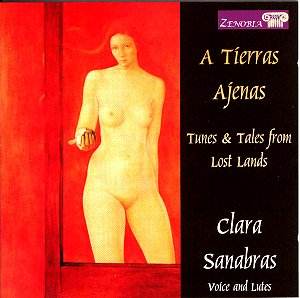This is an enterprising record by the young singer,
Clara Sanabras. Born in Normandy, raised in Barcelona, studying at the
Conservatori del Liceu, Barcelona and the Guildhall, School of Music,
London, she has lived in London since the 1990s. A some time member
of Kent Opera, she sings with the Harp Consort and numerous other early
music groups. In 2002 Linn records released her disc of Irish Folksong
with Lute accompaniment, 'The New Irish Girl'.
On this disc, recorded in 1999, she has surrounded
herself with a talented group of musicians to explore the music of Spain.
Performances of lute songs by 16th century Spanish composers,
taken from sources printed in the 16th century, are interspersed
with performances of traditional Jewish and Arabic music. This goes
to show the way that the music of the various Iberian peoples intersected
and overlapped in the performance of traditional narrative ballads.
As in a lot of traditional western music, some ballads
were captured in print and issued in collections - in this case under
the Catholic Kings, Ferdinand and Isabella. But other developments were
going on. The Arabic oudh and its western development, the lute, were
replaced in Spain by the vihuela - the instrument which developed into
the guitar. And the vihuelistas (vihuela composers) of this period developed
the traditional ballad into a fully developed art-song. Sanabras includes
on the disc an item from each of the major vihuelistas alongside the
traditional materials from which the art-songs sprang.
Clara Sanabras has a voice of enviable flexibility
and resource. In repose, it is a pleasant mezzo-soprano. But she encompasses
a wide range of styles on this recording, moving from the art-song to
the distinctive styles of the Jewish and Sephardic traditional songs.
She joins Abdul Salam Kheir in traditional Arabic numbers and manages
the transition well. As her article in the booklet makes clear, her
performances are intended to highlight the commonality between these
styles, but I must commend Ms. Sanabras, all the same, for her versatility.
Listening to this disc makes me regret my complete
lack of Spanish. Many of the songs are narrative, telling the tales
from lost lands of the title. For some pieces, the texts seems to have
come first; we know the poets but we do not know the composers who musicked
the words. So, having to hear such vital performances through a veil
of translation is a little frustrating. But Clara Sanabras dramatises
them well, often changing her voice to suit the narrative.
The booklet is a little vague about the provenance
of the traditional songs and I would have liked to have known more.
This is one of those discs that wears its learning lightly, encouraging
you to sit back and enjoy the music. All the songs are given in subtle
performances which do not try to overstate these fragile creations.
And Clara Sanabras is not afraid to sing some verses unaccompanied,
a very welcome touch. Quite a group of musicians are listed on the disc,
but the songs are imaginatively and discreetly orchestrated so that
you never feel overwhelmed. The musicians come from a variety of backgrounds,
but the music-making never feels disparate. The various groupings cohere
well and they sound as if they are having fun.
Violinist Rachel Podger appears on four tracks. In
Jewish traditional song, 'Kyria Y'Feliya', she plays the melody line
in a most effective manner and in 'Turkish Melody' provides a most effective
accompaniment to the tune in Sanabras's Oudh. In the other two songs
Podger adds a welcome obbligato. The traditional Sephardic song 'En
la mar hay una torre' is given an interesting bipartite treatment. Initially
Podger and Sanabras perform it in a very traditional folk manner, treating
the song freely, adding generous grace notes. Sanabras follows this
with a much more traditional art-song treatment, accompanied by Adrian
Lee on Oudh. In 'Las mas graciosa serrama', the piece opens with just
violin and drum, to be followed, most effectively, by Sanabras singing
unaccompanied. Only then do all the musicians join together.
For three songs Sanabras is joined in duet by Harvey
Brough. He does not sing with quite the same earthy timbre as Sanabras,
but the diversion of two voices is welcome. In 'Dadme albrizas' the
versatile Brough also doubles on the psaltery. The predominant theme
of much of the poetry is exile and nostalgia for a lost homeland; not
surprisingly since both the Moors and the Jews were expelled. But space
has been found for a few more up-tempo numbers and Michael Zolker adds
a welcome touch of percussion to some of the items. The two Arabic numbers
are both toe-tappingly infectious, surprisingly so given their rather
downbeat subject matter.
At the centre of all this activity is Sanabras singing
a haunting group of songs to her own lute accompaniment. These are all
16th century art-songs - composed rather than arranged. Most
of the songs have a melancholy cast and the text of one, 'Ay, mudo soy',
is a sonnet by Pedro Ordonez, the English translation of which has remarkable
echoes of the Elizabethan lute song ('Oh, I am mute, I cannot speak,/I
die to speak of what I feel./Lady, if this wish were at least granted
to me,/since I suffer at every moment;). The final song on the disc
has a surprising English connection. It comes from Robert Dowland's
'A Musical Banquet’. Son of the more famous John Dowland, he collected
together lute songs from all over Europe in this 1610 publication, so
it is apposite to see the song being repatriated.
I cannot recommend this disc too highly. It provides
a welcome window onto another tradition, a good complement to Elizabethan
lute songs and folk songs. Winningly performed, it makes a fine starting
point for exploring this lovely music.
Robert Hugill



